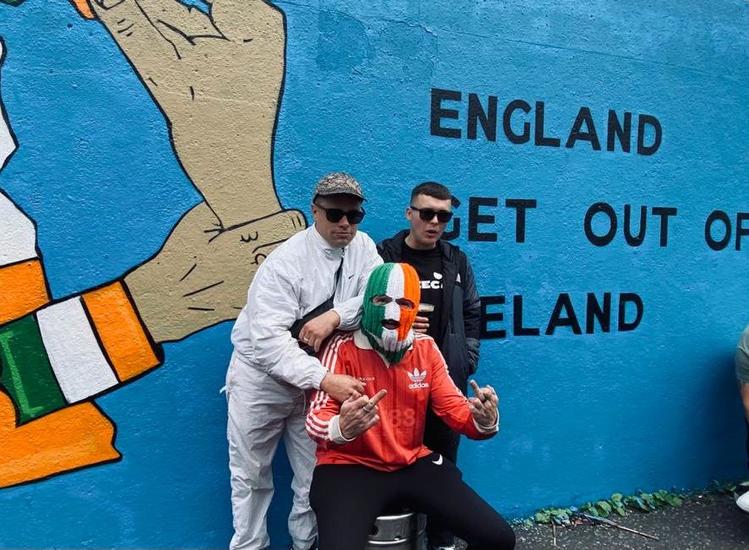By Dave Hannigan
There must be something karmic about the name R. Keane. Mention it in Irish football circles and it will be guaranteed to divide. For more than a decade fans couldn't decide whether the original R. Keane, Roy Maurice, was the greatest player ever to wear a green shirt or the most polarizing international ever. Some would argue he was both. Then came the other R. Keane, Robert David. In the beginning everything he touched turned to goals and the main talking point was just how good he might become. Now, 13 years after his debut for Wolves, the jury remains out on the true extent of his contribution to the game.
It says much for the point in his career that Robbie Keane has reached that the other day Giovanni Trapattoni was asked by a reporter whether his captain was finished at the top level. A brazen enough enquiry to make at a press conference yet one that has been on the lips of many Irish fans all season long, and in some cases, for a couple of seasons now. As is his duty as the manager of the team, the Italian came to the defense of the striker in a way that suggested he thinks the Dubliner is nearing 40 rather than a few months past his 30th birthday.
"Sure, he can't run like [Shane] Long at 23 or 24 but the very best teams are a mixture of experience and energy," said Trapattoni. "Yesterday, it was clear he was not fit enough for 90 minutes because he hasn't been playing for his club. Maybe he didn't pass or shoot as quickly as he would another time but we still need his experience. He has played a lot but if a car has gone for 200,000 kilometers, it doesn't mean it's dead. When fitness isn't right, it's possible a player misses one second, two or three meters and not just last night but also against the Russians, we had two or three chances where those two or three meters made all the difference."
Trapattoni may have used the fitness excuse on this occasion but long-time Keane watchers will testify that missing two or three gilt-edged chances has long been the major drawback in his ability. He has always been one of those strikers who will score the spectacular goal while spurning more straightforward opportunities.
He has made 400 first team starts over the past 13 seasons. That's an average of 30 per campaign. Even by the standards of a sport hung up on resting players in between fixtures and spreading out their contributions over the course of the year, that's not an inordinate amount. For a player who has stayed blessedly free from any major injury it's not an enormous tally, certainly not one that backs up Trapattoni's theory that he's being afflicted by burn-out. It's much more likely that he lacks sharpness due to the lack of match fitness and, unfortunately, it will be January at the earliest before this situation is rectified.
That Keane is done at Spurs for good this time goes without saying. The only serious question is whether somebody else will come in during the transfer window and be willing to take on his exorbitant weekly wage. In this much, he's not the first footballer of recent years to become a prisoner of their own salary. Tottenham gave him what a top player was worth at the time they brought him back to White Hart Lane but as his stock has seriously diminished since, nobody is willing to pay him a reported £65,000 per week any more.
At this point, it seems up to the player and his representatives as to what he should do next. Stay and get richer while watching his ability stagnate on the bench or in the stands in North London or take a pay-cut in order to get back on the field. Increasingly, this is the conundrum of the modern footballer. For somebody who has earned millions from his many transfers since Coventry City first lured him away from Wolverhampton Wanderers, it would seem the latter is the best option. He's only 30 and at the very least should be good for an Indian summer.
Notwithstanding the brief and disastrous interlude at Anfield, a stint that confirmed the belief many of us hold that he's a little short of the elite striker status, Keane has been at Spurs for the best part of a decade. A move somewhere fresh would do him the world of good. Apart from everything else, his relationship with the Spurs' fans has never been the same since his exaggerated delight at the switch to Liverpool that time. To see the benefits of moving somewhere smaller where first-team football is almost guaranteed, he need only look across London.
Damien Duff has revitalized himself and his career since his move to Fulham. All he needed was the boost of knowing that a manager had faith in his ability, being exposed to some different coaching, and the chance to play on a regular basis. That sounds like a prescription to cure Keane's ills at White Hart Lane and to allow him to retain his spot in the Irish team for a while yet. That is another consideration here. Should Keane always start for Ireland because of the goals he's scored in the past or should he be judged on his present form or lack thereof.
This question is rendered moot for now by the lack of options available to Trapattoni. Genuinely viable replacements for Keane aren't exactly banging down the door demanding entry to the international scene. Shane Long is a game competitor but anybody thinking he's capable of firing Ireland to the 2012 European Championships is as misguided as any professional agent who'll tell Keane it's a good idea to stay where he is and take the money from Spurs.











